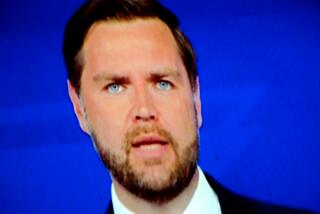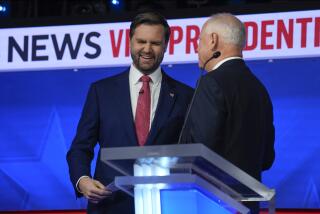Vice presidential debate has something for everyone
- Share via
Washington Bureau
DANVILLE, Ky. — Whether Thursday’s debate between Joe Biden and Paul D. Ryan moved the needle in the presidential contest may have been the only major question left hanging at the end.
The vice presidential showdown was everything the first presidential debate was not: wide-ranging and lively, with very different sorts of passion from each side. It was, in short, 90 nonstop minutes of political theater of a kind that rarely materializes in these high-profile, and often stiff and predictable, televised encounters.
And as a result, both sides had reason to cheer when it was over. Vice President Biden revived the spirits of Democrats depressed by President Obama’s underwhelming showing in last week’s debate. Rep. Ryan offered a calm defense of running mate Mitt Romney’s proposals and a firm denunciation of Obama’s handling of the nation.
Photos: Biden and Ryan square off
Going in, Biden had one overarching, and widely recognized, goal: to halt the damage to the Democratic ticket from Obama’s weak debate performance. In the days since that clash with Romney, Obama’s momentum had been arrested and the Republican nominee took the lead in national polling that had eluded him for months.
Taking up the running mate’s traditional attacker role, Biden was aggressive from the start. He was quick to seize openings against Romney and Ryan that Obama had not — attacking Romney’s dismissive comment about “the 47%” and his personal income tax rate, which is lower than what many far less affluent Americans pay — and describing the Republicans as warmongers. Even in a quietly personal discussion about abortion, he homed in on Ryan’s past objections to allowing the procedure for rape victims.
His performance was not an unadulterated success: Biden frequently appeared dismissive of his younger rival to the point of condescension. He loudly mocked him with repeated laughter that may recall, for some viewers with long memories, Al Gore’s repeated sighs into a debate microphone in 2000 against George W. Bush. (Those sounds wound up hurting Gore.)
The vice president frequently struck a pose of incredulity as Ryan spoke, describing his rival’s answers, more than once, as “malarkey” and at one point as “a bunch of stuff.”
But Biden gave the Obama base a reason to start believing again in their presidential ticket. By relentlessly counter-punching and playing the aggressor, he may have given Obama more running room in his next face-off with Romney.
Ryan’s main goal was the reverse of Biden’s. He needed to sustain Romney’s gains from the first presidential debate, and by coming across as a thoughtful and nonthreatening figure — and avoiding serious blunders — he may well have met that test.
In the biggest moment of his career, Ryan stood his ground. In contrast to Biden’s often overheated responses, the Wisconsin congressman coolly delivered his ticket’s indictment of Obama administration failures at home and abroad.
Like Biden, he directed many of his remarks squarely at his own party’s base, with little of the shift toward the center that marked some of Romney’s recent statements. And in an echo of his mentor, former vice presidential nominee Jack Kemp, he couched his ticket’s austere policies in more hopeful language than is sometimes employed by his running mate.
He only seemed to be stumped once, when moderator Martha Raddatz asked whether a Romney administration would intervene militarily in a humanitarian crisis.
“Each situation will — will come up with its own set of circumstances. But putting American troops on the ground, that’s got to be within the national security interests of the American people,” Ryan responded.
For the most part, the candidates followed campaign talking points, avoiding specifics whenever possible, despite the moderator’s best efforts. But the debate rarely lacked for sharp repartee, as in this exchange over how Romney would pay for his $4.8-trillion tax-cut plan:
Ryan: “You can cut tax rates by 20% and still preserve these important preferences for middle-class taxpayers.”
Biden: “Not mathematically possible.”
Ryan: “It is mathematically possible. It’s been done before. It’s precisely what we’re proposing.”
Biden, chuckling: “It has never been done before.”
Ryan: “It’s been done a couple of times, actually.”
Biden: “It has never been done before.”
Ryan: “Jack Kennedy lowered tax rates, increased growth. Ronald Reagan —”
Biden: “Oh, now you’re Jack Kennedy.”
Those on gaffe patrol for Biden — who famously fails to parse his words carefully enough at times — came away empty-handed. Ryan also avoided any damaging slips.
The latest national opinion surveys show a very close 2012 election contest. The complexion of the race changed significantly after last week’s debate, and Biden is unlikely to have fully flipped the campaign narrative despite his assertive performance.
Vice presidential debates — like vice presidential candidates — simply don’t have that much influence over voter opinions. And this one will have even less time than prior ones have had to generate reverberations in the contest, coming as it does only days before the next presidential clash.
Next Tuesday’s presidential debate, the second of three, could well be the most important event of the entire campaign. The two presidential candidates will meet in a different format — a town-hall-style gathering that could solicit different approaches from them.
With that encounter on the horizon, it may have been enough that the vice presidential candidates set the stage by showing their bosses that a televised debate doesn’t have to be dull, but can be substantive and enlightening.
More to Read
Get the L.A. Times Politics newsletter
Deeply reported insights into legislation, politics and policy from Sacramento, Washington and beyond. In your inbox twice per week.
You may occasionally receive promotional content from the Los Angeles Times.










